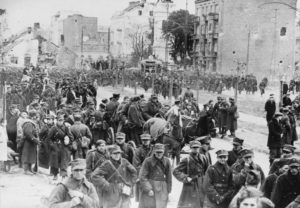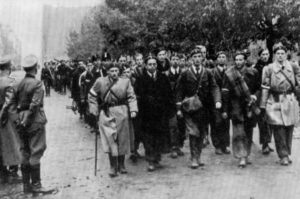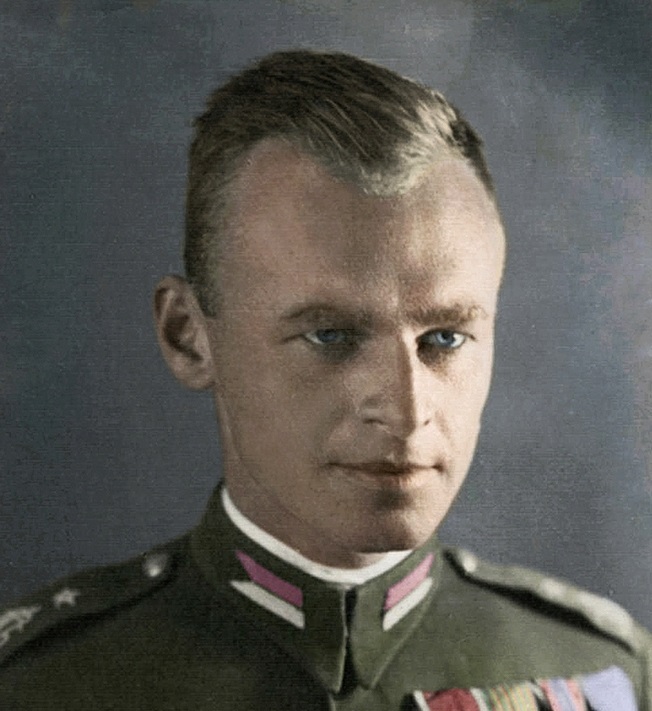Jack Fairweather, The Volunteer: One Man, an Underground Army, and the Secret Mission to Destroy Auschwitz, Custom House: New York 2019
by Igor Niewiadomski
Less than three months have passed since the release of Jack Fairweather’s book, and it remains very popular. Polish media has thoroughly discussed the book, as have the media in Britain (The Times, The Spectator) and America (The Wall Street Journal). Plenty of comments on bookshop websites and bibliophile portals testify to the strong emotions Witold Pilecki’s story can evoke.

This is not the first book about Pilecki. Worthy of mention above all are two comprehensive biographies: Rotmistrz Pilecki, published in 1994 by Wiesław Wysocki (then published in 2000 as Witold Pilecki „Serafiński”), and Rotmistrz Pilecki. Ochotnik do Auschwitz by Adam Cyra. Fairweather refers to these books, and at the beginning of his book discusses the merits of Cyra in researching the fate of Witold Pilecki.
It is also not the first book about Pilecki written in a language other than Polish. It is mandatory to mention another book, Il volontario by Marc Patricelli, although Fairweather does not refer to it. After all, The Volunteer is a pioneering book in its own way – addressed primarily to people who are less familiar with the realities of Polish history. It also appears that Patricelli’s book is known to a wider, global readership.
Fairweather, an experienced war correspondent in Iraq, presents Pilecki’s life more as a journalist than as a historian. Through the prism of Pilecki’s biography, Fairweather also talks about the history of Poland during the Second World War. For each sentence about Pilecki, there are often several more with information about the historical context. The reader will learn much about the formation of the Union of Armed Struggle, the activities of the Polish government-in-exile and the course of the Warsaw Uprising. In addition, Fairweather’s narrative is enriched by maps by John Gilkes. This is especially useful when the author describes a given political situation, the structure of the Auschwitz-Birkenau camp or the route that Pilecki covered during the war.

The great advantage of the book is its logical structure. The author divides his story into four main parts. The first three relate to Pilecki’s history during the Second World War, with the last about the post-war period, which, however, is treated rather briefly. I must admit that the book is very well written – short dialogues that give it a fast rhythm are a constant element of the narrative.
With a very rich bibliography, the book has a light, popular-science character. It is a piece of solid journalism, well embedded in factography, with elements of an almost literary narrative. As a result, the reader may remember many small but symbolic events, which may often slip away in the thicket of factography. A good example is the importance of weather, e.g. the winter weather on the day of Warsaw’s surrender on 28 September 1939, or how to cope with weather conditions in a concentration camp.
Fairweather relate primarily about Pilecki during the Second World War. In the whole picture, the key is Pilecki’s mission to establish an efficient underground organization in the Auschwitz-Birkenau camp. The very fact that he voluntarily agreed to such a huge sacrifice and went behind the camp wires is treated as a measure of extraordinary heroism, although the word “hero” is almost absent in the book. The morality of the “average man” attitude, when “others looked away”, is the focus of all efforts. This fascinates the author and he wants to fascinate his readers.

The author does not have research ambitions, which is why specialists may find the book an imitative work. Still remaining is the question of why it was Pilecki who was selected for his mission by the Secret Polish Army and the Union for Armed Struggle – yet Fairweather devotes no more than three paragraphs to this matter. Similarly, he does not delve into the problem of relations connecting Pilecki with the man who became prime minister of Communist Poland, Józef Cyrankiewicz.
Although both were prisoners and conspirators in Auschwitz, the first was then sentenced by a Communist-era court to death, while the second became one of the highest dignitaries of the new regime. The author devotes much space to Pilecki’s escape from Auschwitz, as well as to his hiding (a section very eloquently titled “Alone”). His fate in the Warsaw Uprising is also vividly depicted, when Pilecki commanded one of the units fighting in the vicinity of Żelazna Street and Aleje Jerozolimskie.
Fairweather’s book is not only an opportunity to get acquainted with the character of Pilecki himself, but also with many people whose merits very often are lost in statistics of “great history”. Those widely discussed include the figure of Tadeusz Teddy Pietrzykowski, a boxer from Auschwitz, Lt. Col. Kazimierz Rawicz, a prisoner at Auschwitz and at Mauthausen, and Napoleon Segieda, a courier informing the Allies about the scale of the Holocaust on Polish territories occupied by the Third Reich. Exploring the fate of these characters is also aided by a valuable annex in the form of short biographies of the most important people appearing in the book. In addition to people known to Pilecki, there are also short biographies of perpetrators appearing in the context of the historical background, which helps the reader who is less familiar with history. Hence, additional biographies appear of perpetrators such as Erich von dem Bach-Zelewski and Heinrich Himmler.

To sum up, the biography of Witold Pilecki by Jack Fairweather presents not only the unique history of the “volunteer to Auschwitz” himself, but also the tragic fate of Poland and its citizens. The book accomplishes its primary goal, which is popularization of the subject itself. This work will not only reach readers interested in the history of the Second World War, but many lovers of good literature.
In the end, the author expresses the hope that his book will help propagate the story of Witold (as he calls his hero in the epilogue). Will the next step be the creation of a comprehensive feature film about the main character of the book? Let’s hope so. The story of Witold Pilecki is an allegory of 20th-century tragedy in which, nonetheless, you can find a strong ray of hope.
Author: Igor Niewiadomski
Translation: Alicja Rose & Alan Lockwood





